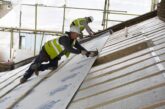
On February 7th 2020 the government closed its consultation on reforms to energy regulations and the Future Homes Standard. While they have yet to publish their findings, David Holmes of Boiler Guide explores how changes to Building Regulations L and F could impact heating engineers working in the new build market.
Despite the uncertainty created by the December 2019 election, the government has now confirmed that it will push ahead with the Future Homes Standard, including banning all fossil-fuel heating from newly built homes from 2025. In addition, the government has also outlined changes to Parts F and L of the Building Regulations which relate to energy efficiency and ventilation.
The changes are the result of mounting pressure on the government to ramp up the fight to reduce carbon emissions. In 2019 our former PM, Theresa May, pledged a 50% reduction in carbon emissions by 2030 and we now have a new target of not just significantly reducing our carbon emissions by 2050, but to become a net-zero country.
But how will these plans affect heating engineers?
Part L: Energy Efficiency
In its consultation, the government has proposed two potential routes to improving energy efficiency in newly built homes. The first focuses mainly on reducing heat loss by making improvements to the building fabric, insulation, waste water heat recovery systems and triple glazing. This would result in a 20 per cent reduction in carbon emissions.
The second route, which more directly impacts heating engineers, will combine the improvements to the building fabric with low-carbon heating systems and microgeneration energy systems like solar panels. This is the preferred option as it would lead to a 31 per cent reduction in carbon emissions.
Low carbon heating options
According to the recent government announcement that the Renewable Heat Incentive scheme will be extended by a year to March 2022, these low carbon heating solutions are likely to be a combination of green gas, heat pumps and heat network. This includes the greening of the gas grid through a new support scheme for biomethane, funded by a Green Gas Levy.
There is also a lot of research and development going into testing the viability of adding hydrogen to the natural gas grid (with the same or very similar boiler technology remaining) with the aim of gradually phasing out natural gas entirely.
The government has pledged support for the installation of heat pumps and biomass boilers through a new Low Carbon Heat Support Scheme. This will be a £100m grant scheme available to households and small businesses from 2022 enabling them to invest in heat pumps and biomass boilers.
Looking even further ahead, the government’s paper suggests that heat networks in densely populated areas and a limited amount of direct electric heating (where the electricity is generated via renewable technology) will also play a key role in the design of future homes.
What could the changes mean for heating engineers?
The government appears to be favouring the concept of air source heat pumps being installed in new build homes, but there are currently very few installers who are qualified to install this technology. Heating engineers who are able to upskill in heat pump installation will find their services in great demand in the not so distant future.
Electric heating systems are also likely to play a big role in the future homes standard, so it makes sense for heating engineers to achieve electrical qualifications to complement their plumbing skills.
Of course, the need for skilled gas engineers is not likely to dwindle any time soon as in addition to the Green Gas Levy support for biomethane, the government has now invested £70 billion into developing a hydrogen production, storage and distribution network. This strongly suggests that the gas grid and boiler technology have a strong future in the UK, even as and when natural gas is phased out.
While the legislation is not going to be enforced until 2025, the new homes building sector will be planning their developments years in advance, so the sooner heating engineers can expand their skill set, the brighter their professional future.
![]()







